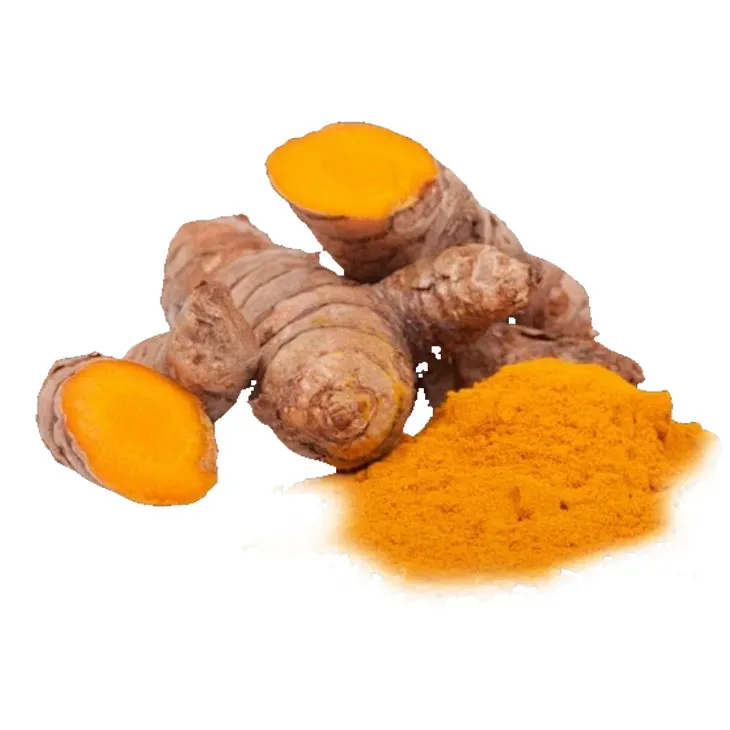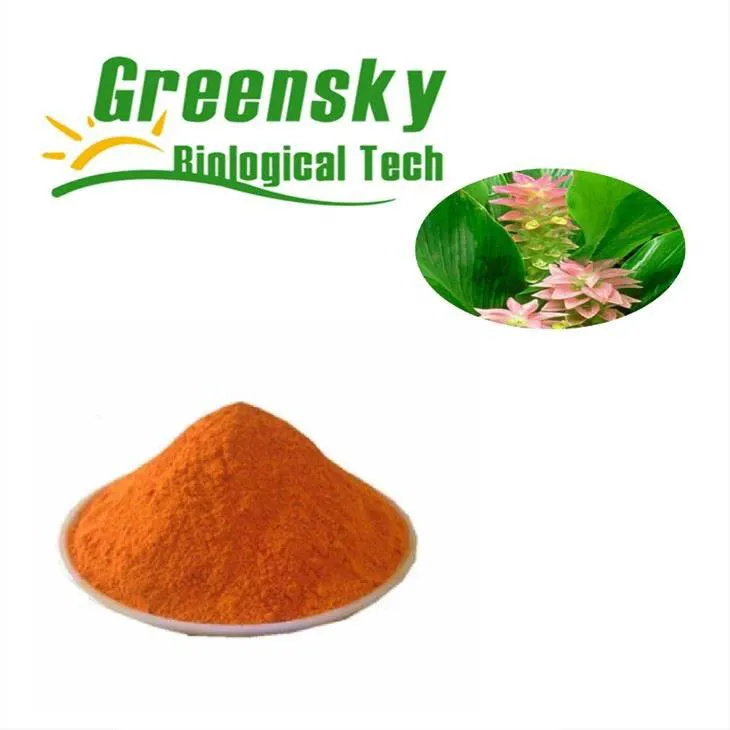- 0086-571-85302990
- sales@greenskybio.com
Curcumin: Nature's Best - Kept Secret.
2024-11-12

1. Introduction
Curcumin, a natural compound derived from turmeric, has long been a hidden gem in the world of natural remedies. Turmeric, a bright yellow spice commonly used in Asian cuisine, has been known for its medicinal properties for centuries. However, it is only in recent decades that the active ingredient Curcumin has started to gain significant attention from the scientific community. This article delves into the various aspects of Curcumin, exploring why it is nature's best - kept secret.

2. The Health - Promoting Properties of Curcumin
2.1 Anti - Inflammatory Power
One of the most remarkable properties of curcumin is its anti - inflammatory power. Inflammation is a natural response of the body to injury or infection. However, chronic inflammation can lead to a host of diseases, including arthritis and heart disease. Curcumin has been shown to modulate the body's inflammatory response at a molecular level. It inhibits the activation of certain inflammatory pathways, such as the NF - κB pathway. By doing so, it can reduce the production of pro - inflammatory cytokines and enzymes, which are responsible for causing inflammation in the body.
Studies have been conducted on patients with arthritis, and the results are promising. Curcumin supplementation has been shown to reduce joint pain and swelling in some cases. In the context of heart disease, chronic inflammation in the blood vessels can contribute to the development of atherosclerosis. Curcumin's anti - inflammatory effects may help prevent or slow down this process by reducing inflammation in the arterial walls.
2.2 Antioxidant Capabilities
Another important aspect of curcumin is its antioxidant capabilities. The body is constantly exposed to free radicals, which are unstable molecules that can cause damage to cells and tissues. Free radicals are generated through normal metabolic processes, as well as exposure to environmental factors such as pollution and radiation. If left unchecked, free radical damage can lead to oxidative stress, which is associated with various diseases, including cancer and neurodegenerative disorders.
Curcumin acts as an antioxidant by scavenging free radicals and neutralizing their harmful effects. It has been shown to be particularly effective against reactive oxygen species (ROS) and reactive nitrogen species (RNS). By protecting the body's cells and tissues from oxidative damage, curcumin may play a role in preventing the development of chronic diseases.
2.3 Role in Metabolic Health
In recent years, there has been a growing interest in curcumin's potential role in metabolic health. Metabolic syndrome, which is characterized by a combination of factors such as obesity, high blood pressure, abnormal lipid metabolism, and insulin resistance, has become a major public health concern. Curcumin may have beneficial effects on several aspects of metabolic health.
With regard to lipid metabolism, curcumin has been shown to influence the levels of cholesterol and triglycerides in the blood. It may help lower LDL (low - density lipoprotein) cholesterol, which is often referred to as "bad" cholesterol, while increasing HDL (high - density lipoprotein) cholesterol, the "good" cholesterol. In terms of blood sugar regulation, curcumin may improve insulin sensitivity, allowing cells to better respond to insulin and regulate blood glucose levels more effectively.

3. The Science Behind Curcumin
3.1 Molecular Interactions
From a molecular perspective, curcumin is a fascinating compound due to its ability to interact with multiple cellular targets. It can bind to various proteins, enzymes, and receptors in the cell, which is what gives it its diverse range of biological activities.
For example, curcumin can bind to transcription factors, which are proteins that regulate gene expression. By binding to these transcription factors, curcumin can influence the expression of genes involved in inflammation, antioxidant defense, and metabolism. It can also interact with enzymes involved in cell signaling pathways, such as kinases and phosphatases. These interactions can modulate the activity of these enzymes, thereby affecting cellular processes.
Furthermore, curcumin can interact with cell surface receptors, which are proteins that are involved in cell - cell communication and signal transduction. By binding to these receptors, curcumin can trigger a cascade of intracellular events that can have various physiological effects.
3.2 Bioavailability and Delivery Systems
One of the challenges associated with curcumin is its relatively low bioavailability. Bioavailability refers to the proportion of a drug or compound that reaches the systemic circulation and is available to exert its biological effects. Curcumin has poor solubility in water and is rapidly metabolized in the body, which limits its bioavailability.
To overcome this issue, researchers have been exploring various delivery systems for curcumin. These include nanoparticle - based delivery systems, liposomal formulations, and complexation with other compounds. Nanoparticle - based delivery systems can protect curcumin from degradation and improve its solubility, thereby enhancing its bioavailability. Liposomal formulations can encapsulate curcumin and target it to specific cells or tissues, increasing its effectiveness.

4. Curcumin in Research and Clinical Trials
4.1 Pre - clinical Studies
Pre - clinical studies, which are conducted in laboratory animals and cell cultures, have provided a wealth of information about the potential benefits of curcumin. These studies have explored curcumin's effects on various diseases, including cancer, neurodegenerative diseases, and inflammatory disorders.
In cancer research, curcumin has been shown to have anti - cancer properties. It can inhibit the growth and proliferation of cancer cells, induce apoptosis (programmed cell death), and prevent angiogenesis (the formation of new blood vessels that supply nutrients to tumors). In neurodegenerative disease research, curcumin has been investigated for its potential to protect neurons from damage and reduce the accumulation of amyloid - beta plaques, which are characteristic of Alzheimer's disease.
However, it is important to note that pre - clinical studies have limitations. The results obtained from laboratory animals may not always translate directly to humans due to differences in physiology and metabolism.
4.2 Clinical Trials
Clinical trials are essential for evaluating the safety and efficacy of curcumin in humans. There have been numerous clinical trials conducted on curcumin for various conditions. In some trials, curcumin has shown positive results in reducing symptoms of arthritis, improving lipid profiles, and enhancing cognitive function.
For example, in a clinical trial on patients with rheumatoid arthritis, curcumin supplementation was associated with a reduction in pain and improvement in joint function. In another trial on patients with hyperlipidemia, curcumin was shown to lower LDL cholesterol levels. However, the results of clinical trials have also been inconsistent in some cases, which may be due to factors such as differences in study design, dosage, and patient populations.

5. Why Curcumin is a Secret Worth Exploring
Curcumin is a natural compound with a wide range of potential health benefits. Despite being a part of traditional medicine for centuries, it is still relatively unknown to the general public in terms of its scientific basis. There are several reasons why curcumin is a secret worth exploring.
- Natural Origin: Curcumin is derived from turmeric, a natural spice. This makes it an attractive alternative to synthetic drugs, as it is generally considered to be safer with fewer side effects.
- Diverse Health Benefits: As discussed earlier, curcumin has anti - inflammatory, antioxidant, and metabolic - regulating properties. It has the potential to impact multiple aspects of health, making it a promising candidate for the prevention and treatment of various diseases.
- Research Potential: The fact that curcumin interacts with multiple cellular targets makes it a fascinating subject for further research. Understanding its molecular mechanisms can lead to the development of new drugs or therapies based on curcumin or its derivatives.

6. Conclusion
Curcumin, nature's best - kept secret, holds great promise in the field of health and medicine. Its anti - inflammatory, antioxidant, and metabolic - regulating properties, along with its ability to interact with multiple cellular targets, make it a compound worthy of in - depth study. While there are still challenges to overcome, such as its low bioavailability, ongoing research and the development of novel delivery systems are likely to unlock the full potential of curcumin in the future. As more research is conducted and the knowledge about curcumin expands, it may become an important part of preventive and therapeutic strategies for a wide range of diseases.
FAQ:
What is curcumin?
Curcumin is a natural compound that is derived from turmeric. It has a variety of health - promoting properties, such as anti - inflammatory and antioxidant capabilities.
What are the anti - inflammatory benefits of curcumin?
Curcumin's anti - inflammatory power can be beneficial for conditions like arthritis and heart disease. It helps to reduce inflammation in the body, which is often a factor in these and other health issues.
How does curcumin act as an antioxidant?
Curcumin has antioxidant capabilities that safeguard the body's cells and tissues. It can neutralize free radicals, which are unstable molecules that can cause damage to cells, thereby protecting the body from oxidative stress.
What is curcumin's role in metabolic health?
In recent years, there has been growing interest in curcumin's potential role in metabolic health. It may influence lipid metabolism and blood sugar regulation, which are important aspects of maintaining a healthy metabolism.
Why is curcumin considered a 'hidden treasure'?
Curcumin is considered a 'hidden treasure' because, despite its many potential health benefits, it is not as well - known as it could be. It has only recently started to gain more attention in the scientific and medical communities, and there is still much to be discovered about its full range of effects.
Related literature
- Title: The Chemistry and Biology of Curcumin"
- Title: "Curcumin: A Review of Its' Effects on Human Health"
- Title: "Potential of Curcumin in Metabolic Syndrome Management"
- ▶ Hesperidin
- ▶ Citrus Bioflavonoids
- ▶ Plant Extract
- ▶ lycopene
- ▶ Diosmin
- ▶ Grape seed extract
- ▶ Sea buckthorn Juice Powder
- ▶ Fruit Juice Powder
- ▶ Hops Extract
- ▶ Artichoke Extract
- ▶ Mushroom extract
- ▶ Astaxanthin
- ▶ Green Tea Extract
- ▶ Curcumin
- ▶ Horse Chestnut Extract
- ▶ Other Product
- ▶ Boswellia Serrata Extract
- ▶ Resveratrol
- ▶ Marigold Extract
- ▶ Grape Leaf Extract
- ▶ New Product
- ▶ Aminolevulinic acid
- ▶ Cranberry Extract
- ▶ Red Yeast Rice
- ▶ Red Wine Extract
-
Oyster Mushroom Extract Powder
2024-11-12
-
Giant Knotweed Extract
2024-11-12
-
Diosmin
2024-11-12
-
Medicinal Marshmallow Extract
2024-11-12
-
Buckthorn bark extract
2024-11-12
-
Nutmeg Extract
2024-11-12
-
Black Garlic Extract
2024-11-12
-
Sophora Flavescens Root Extract
2024-11-12
-
Artichoke Leaf Extract
2024-11-12
-
Cassia Seed Extract
2024-11-12





















